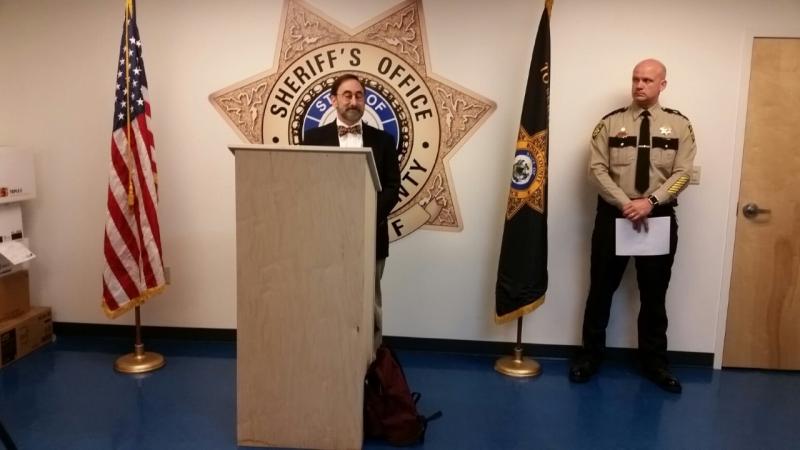Knox County Sheriff’s Office, Mid-Coast Recovery Coalition work to reduce recidivism

ROCKLAND — Many inmates face challenges when re-entering the community after release from jail. Finding a place to live, getting a job with a living wage, ongoing support for addictions, help with finances, getting health insurance, and having reliable transportation are just a few.
Sometimes inmates feel it is just easier to stay in jail.
At a press conference March 17 at the Knox County Sheriff’s Office, Lt. Cynthia Gardner, coordinator of jail services and inmate programs at the Knox County Jail, said that inmates have even told her that they need to be in jail because they would be found dead on the street if not arrested again.
The Mid-Coast Recovery Coalition and the Knox County Sheriff’s Office said they have partnered to change that way of thinking. They are designing a re-entry process for Knox County Jail inmates that is to increase chances of a successful community re-integration.
MCRC founder Ira Mandel said that it is about changing attitudes and giving inmates the support they need to help them succeed in their lives outside of jail. Too many times inmates lack the resources resulting in instances of re-arrest and re-incarceration.
Currently, the level of services available for inmates at the Knox County Jail, many of whom have addiction issues, are limited and not able to support all of the challenges and even barriers they face after their release from jail. Maine Pretrial Services provides some basic assistance, but transportation and housing assistance are lacking, said Gardner.
MCRC and the Knox County Sheriff’s Office believe that by designing a re-entry program for inmates, they can begin to break down those barriers.
Re-entry programs already exist in Waldo and Lincoln counties and Mandel believes Knox County can benefit by implementing these same models.
Chief Deputy Tim Carroll also said that patrol officers will now begin carrying the anti-overdose drug, naloxone, or “narcan,” its brand name, for opiod and heroin victims.
It works by displacing opiods from the victims’ receptors in their brains, and rousing people at the risk of dying from an overdose as their breathing slows. One method is to administer the drug as a nasal spray device.
Carroll said that the officers will now have the opportunity to prevent a possible overdose fatality and get an addict on the path to recovery instead of inside a jail cell. Jail Administrator Major John Hinkley added that “jail is not the answer for people with addictions.”
Mandel said that the coalition is actively fundraising for the jail re-entry project, especially with obtaining grants, but participants have decided to move forward with initiating the project.
One inmate will be selected for a pilot project with the intent to serve every inmate.
The first big step is training volunteer mentors to work with inmates. Another collaborator in the program, the Restorative Justice Project of the Midcoast, is conducting the 30-hour training for mentors.
One of the MCRC board members, Patrick Mundy, has been mentoring inmates from the Maine State Prison. Mundy said mentors will be screened after they apply. The training will emphasize that mentors should not get involved in personal issues of inmates and understand boundaries while assisting with them with the re-entry process.
“Many employers have been receptive to hiring inmates for summer help and also hiring them for regular employment after their release from jail. This is a very positive community link, already in place, for the program,” said Mundy.
Mandel emphasized that the re-entry program is about changing attitudes.
“It’s hard to get back from having your brain ‘hijacked’ by drugs,” he said.
“You can’t force somebody to get off drugs,” said Sheriff Donna Dennison. “They have to want to.”
Mandel emphasized that implementing the services will not guarantee a 100 percent success rate. Dennison did not have the exact rate of inmates who are re-incarcerated at the jail but said it is high.
During the press conference, Mandel shared statistics from the Urban Institute, a think tank in Washington D.C., that reports on social policy research. It reported that 70 percent of American inmates are high school dropouts, 50 percent are functionally illiterate and 19 percent have fewer than eight years of education.
Mandel said that they are going to need help from the community.
“There are still huge gaps with housing, transportation, and many inmates have a history with OUI convictions so they cannot drive,” he said.
“It’s about taking baby steps, collectively as a community, and there definitely is hope,” said Mandel.
Anyone from the community who is interested in supporting the re-entry program, including becoming a volunteer mentor, should contact MCRC at 701-1182 or email them at info@midcoastrecovery.org.
Reach Sarah Shepherd at news@penbaypilot.com

























